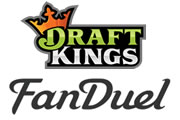Does FanDuel's and DraftKings' Merger Violate Anti-Trust Laws?

DraftKings and FanDuel have been attempting to merge for nearly a year. The biggest roadblock in their way has been an FTC investigation into whether or not the companies merging constitutes a violation of the anti-trust laws in the US. One of the biggest problems the two DFS moguls are facing is how they are categorized.
If you place DraftKings and FanDuel into a singular market of just daily fantasy sports, then you’d see that they make up roughly 90% of that market, which clearly gives them a monopoly. But neither company markets itself as just Daily Fantasy Sites – rather, they classify themselves within the larger, overarching Fantasy sports category, alongside sites like ESPN and Yahoo!. They say that because they offer season-long fantasy options alongside daily ones, they should not be pigeon-holed.
Under these specifications, DraftKings and FanDuel hardly constitute a blip on the Fantasy radar. More importantly, their merger wouldn’t violate anti-trust laws. “The broader the marketplace, the better for their proposed combination,” said Florida-based lawyer Daniel Wallach, an expert on sports and gaming law. “The more persuasively they can make that case, the more likely they are to survive antitrust scrutiny.”
While the merger was never expected to be an easy one, CEOs Nigel Eccles (FanDuel) and Jason Robins (DraftKings) didn’t think that they would ultimately have a problem securing FTC approval. In addition to believing that they are just a couple of small fish in a very large, overarching Fantasy pool, they also aren’t stifling their competition or creating an unpenetrable market.
The news of the proposed merger was made in 2016 in late November – nearly a year ago. Since that time, there haven’t been any companies who decided not to go through with their plans to open a new DFS site. There haven’t been any companies that have reduced their offerings because of it, and there haven’t been any companies that have been forced out of business by the idea that the two companies would become one.
Don’t get me wrong – there have been a couple of companies that have closed down – but this is for the same reason that FanDuel and DraftKings want to merge. There’s simply too much legal ambiguity to make a profit at this time.
You see, it wasn’t a stiflingly competitive field that’s kept smaller DFS companies from being able to flourish – it’s the lack of clarity in state laws. While the federal law UIGEA allows for a Daily Fantasy niche to legally operate throughout the country, state lawmakers are still confused as to whether or not betting on Fantasy sports constitutes gambling.
Daily Fantasy companies have maintained that they are not gambling sites, but rather skill-based competitions. But a number of state Attorneys General have decided that, in their legal opinion, DFS sites violate gambling laws that are currently in place. This creates a gray area for the sites, as there technically is no law preventing them from operating in a state, but there’s no law allowing them to do so, either. Basically, they remain in a state of constant worry that they could get shut down at a moment’s notice – and no one wants to put their money into a site that might get shut down.
In a big way, this legal ambiguity is what led to the two major DFS companies needing to merge in the first place. After several influential states like New York and Texas began kicking fantasy sites out, the market went into a tailspin. Draftkings and FanDuel spent a year traveling the country trying to get legislation passed so that they could come out of the gray area and offer residents legal daily fantasy sports.
To date, they have succeeded in getting a foothold in 12 states, but that still leaves over 75% of the country in the dark as to whether DFS is legal or not in their state. It is this gray area that is killing off a huge number of potential businesses, not FanDuel’s and Draftkings’ merger.
“The truth is that many companies who would have been natural competitors for FanDuel and DraftKings, especially casinos and other gambling operators, stayed on the sidelines due to legal ambiguity surrounding the product,” said Chris Grove, a contributor at Legal Sports Report. If states like Nevada and New Jersey got behind regulated fantasy sports, you’d see all of the major casinos opening up sites so fast it would make your head spin.
The merger of these companies isn’t a violation of anti-trust laws. It’s an attempt for two legal betting sites to come together so they can finally make a profit at legal gambling in the USA. According to sources close to the case, the FTC is expected to make their decision soon. It is yet unknown as to whether or not they’ll rule in favor of the merger.




